
www.XtremeAirUsa.com PAGE 2
IMPORTANT NOTICE: The Important Safety Instructions and warnings in this manual are not meant to cover all possible problems and/or situations that can
occur upon installation of this unit. Use extreme caution when installing, maintaining or operating this or any other appliance. Contact the XtremeAir USA, LLC,
Customer Support Team at 1.714.554.9000 or email: support@XtremeAirUsa.com with any concerns or situations that you do not understand. The
manufacturer disclaims all liability for any damage or injury caused as a result of not following instructions for installation contained
in this manual.
To avoid the possibility of an explosion or fire, do not store or use combustible, flammable or explosive vapors and liquids (such as gasoline) inside or in the
vicinity of this or any other appliance. Keep all combustible items (such as aerosol cans) away from cook top burners, ovens and range hoods. Do not store
flammable or explosive materials in adjacent cabinets or surrounding areas.
Disclaimer
: The manufacturer and/or distributor/reseller decline all responsibility in the event of failure to observe the instructions provided for installation,
maintenance and suitable use of the product. The manufacturer and/or distributor/reseller shall NOT be responsible for any injury due to negligence and the
warranty of the unit shall automatically be voided due to failure to observe proper safety and installation procedures. The manufacturer and/or
distributor/reseller will not be held responsible for any damages to personal property or real estate or any bodily injuries whether caused directly or indirectly
by the range hood.
WARNING - TO REDUCE THE RISK OF FIRE, ELECTRIC SHOCK, OR INJURY TO PERSONS, OBSERVE THE FOLLOWING:
*Use this unit only in the manner intended by the manufacturer. If you have questions, contact the manufacturer.
PRODUCT: Do not remove permanently affixed labels, warnings or plates from the product. This may void the warranty. Do not try to alter the hood.
INSTALLATION: The installation in this manual is intended for qualified installers, service technicians or persons with a similar qualified background. Installation
and electrical wiring must be provided by qualified professionals and in accordance with all applicable codes and standards, including fire-related construction.
When cutting or drilling into the wall or ceiling; do not damage electrical wiring and other utilities. It is recommended that two or more people assist with the
installation. The range hood may have very sharp edges; please wear protective gloves if it is necessary to remove any parts for installing, cleaning or
servicing.
VENTING: For kitchen range or cook top ventilating use only. DO NOT use units to exhaust hazardous or explosive materials and vapors. Ducted fans MUST
always be vented to the outdoors. DO NOT vent exhaust into spaces between walls, crawl spaces, ceiling, attics and/or garages. Use only metal ductwork. Old
duct work should be cleaned or replaced if necessary to avoid the possibility grease fires. Check all joints on ductwork to insure proper connections. All joints
should be properly taped.
ELECTRICAL: All electrical wiring must be properly installed, insulated and grounded. TURN POWER OFF and un-plug cords from outlet before servicing and/
or cleaning to insure your safety.
OPERATION: Caution is suggested when using high settings on cooking range. Keep all fan, baffle, spaces, filter, grease tunnel, oil container and grease-
laden surfaces clean. Grease should not be allowed to accumulate on fan, baffle, spaces, filter, grease tunnel, and oil container. Never allow the filters to
become blocked or clogged. Do not allow foreign objects such as cigarettes and/or napkins, to be absorbed into the hood. Clean ventilating fans frequently.
Grease should not be allowed to accumulate on the fan or filters.
DANGER
1 IMPORTANT SAFETY INSTRUCTIONS ......................................................................................................................... 2
2 HEIGHT & CLEARANCE ............................................................................................................................................ 3
3 VENTING REQUIREMENT .......................................................................................................................................... 3
4 VENTING METHODS ................................................................................................................................................. 3
5 ELECTRICAL REQUIREMENT ...................................................................................................................................... 3
6 TOOLS YOU WILL NEED ............................................................................................................................................. 3
7 PARTS SUPPLIED ...................................................................................................................................................... 4
8 GENERAL INSTALLTION DIAGRAM ............................................................................................................................ 4
9 INSTALLATION ......................................................................................................................................................... 5
10 OPEN & REMOVE BAFFLE FILTERS ............................................................................................................................. 6
11 RANGE HOOD OPERATION ........................................................................................................................................ 6-7
12 SPECIFICATION ........................................................................................................................................................ 7
13 TROUBLESHOOTING ................................................................................................................................................. 7-8
14 USE & CARE INFORMATION ...................................................................................................................................... 8
15 MAINTENANCE ........................................................................................................................................................ 8
16 PRODUCT WARRANTY .............................................................................................................................................. 9
TABLE OF CONTENTS
1. IMPORTANT SAFETY INSTRUCTIONS

www.XtremeAirUsa.com PAGE 3
IMPORTANT: Observe all governing building codes and city ordinances.
A 120 volt, 60 Hz., AC, 15-amp outlet is needed (fused electrical circuit is required)
It is the customer’s responsibility:
1. To contact a qualified electrical installer. To assure that the electrical installation is adequate and in conformance with National Electrical Code, ANSI/ NFPA
70 — latest edition*, or CSA Standards C22. 1-94, Canadian Electrical Code, Part 1 and C22. 2 No. 0-M91 - latest edition and all local codes and ordinances.
2. HEIGHT & CLEARANCE
3. VENTING REQUIREMENTS
IMPORTANT:
NEVER exhaust air or terminate ductwork into crawl spaces, between walls, ceiling, attics or garages. All exhaust
must be ducted to the outside.
Hood mounted too low could result in heat and/or fire hazard. Hoods mounted too high will be hard to reach and will lose
its performance and efficiency.
Use metal ductwork only.
DO NOT use plastic ventilation.
DO NOT use 4” (10.2 cm) laundry-type wall caps.
Fasten all connections with sheet metal screws. Tape all joints with aluminum tape.
Use caulking to seal exterior wall or roof openings around the cap.
The ventilation system must have a damper. If the roof or wall cap has a damper, you may opt out from usage of your
range hood supplied damper (for some models only).
For the most efficient & quiet operation:
A distance of 26” to 30” is recommended between stove top and the bottom of range hood.
It is recommended that the range hood be vented vertically through the roof with a minimum of a 6” or larger vent work.
ALWAYS, when possible, reduce the number or transitions and turns. If a long duct run is required, increase duct size from
6” to 7” or 8”. If a reducer is used, install a long reducer instead of a pancake reducer. Reducing duct size will
restrict/decrease airflow.
The size of the vent should be uniform.
Use no more than three 90° elbows.
Make sure there is a minimum of 24” (61 cm) of straight vent between the elbows if more than one elbow is used.
4. VENTING METHODS
5. ELECTRICAL REQUIREMENTS
6. TOOLS YOU WILL NEED
Min 26”
Max 30”
36” Base
(2) 2” x 4” x 24” stud
(1) 24” x 36”/42” x ¾” plywood
Note: about 6” wider than stove is ok
Cabinet Jack
OPTIONAL
Pencil or Marker
Phillip Screwdriver
Level
Aluminum Tape
Wall/Keyhole Saw
Tape Measure
Powered Screwdriver

www.XtremeAirUsa.com PAGE 4
PART SKETCH
DESCRIPTION
P
1
CEILNG MOUNT
BRACKET (W/18
ATTACHED BOLTS
P
2
(4) MULTI-HOLE
BRACKET (W/ 16
ATTACHED BOLTS)
P
3
(4) LOWER
CHIMNEY
BRACKET (W/ 16
ATTACHED BOLTS)
(4) 1 ¾” SCREWS
P
5
ALUMINUM PIPE
(2) DUCT CLAMP
REMOTE
CONTROL
G
U
S
C
UPPER “SLOT”
CHIMNEY
U
H
C
UPPER “HOOK”
CHIMNEY
L
S
C
LOWER “SLOT”
CHIMNEY
L
H
C
LOWER “HOOK”
CHIMNEY
MANUAL BOOK
7. PARTS SUPPLIED
8. GENERAL INSTALALTION DIAGRAM
IMPORTANT: DUE TO THE WEIGHT AND SIZE OF THIS UNIT, CEILING
BRACKET MUST BE MOUNTED TO A WEIGHT-BEARING CEILING
(SUPPORT SYSTEM OR FRAMEWORK BEING USED IS STABLE AND
SECURE ON THE CEILING) ABLE TO SUPPORT AT LEAST TWICE THE
WEIGHT OF THE HOOD.
D1
D2
D3
D4
D5
D6
D7
D9
11.3
inch
3.8
inch
13.6
inch
23.0
inch
19.0
inch
23.6
inch
35.4/41.3/ 47.2
inch
5.75
inch
Ceiling
mount
bracket
depth
Ceiling mount
bracket
perimeter
height
Ceiling
mount
bracket
width
Upper
chimney
length
Lower
chimney
length
Body
depth
Body width (I36,
I42 , I48)
Body
height
DIMENSION TABLE
D8: Total bracket length. See formula below
D8 = CEILING HEIGHT FROM FLOOR – D11 – D10 – D9
D10: Clearance from bottom of hood to cook top (26” to 30” as per your design)
D11: Cook top height from floor (36”)

www.XtremeAirUsa.com PAGE 5
STEP #3: INSTALLING “SUPPORT BRACKET”
STEP #4: ATTACHING HOOD BODY
STEP #5: INSTALLING CHIMNEYS - DO NOT REMOVE CHIMNEY PROTECTIVE FILM UNTIL FINISHED INSTALLATION
STEP #2: INSTALLING “CEILING BRACKET”
A. Cut out a hole in the ceiling where the ducting
will go.
B. Prepare support framework for ceiling
bracket.
C. Place chimney bracket against ceiling & screw
it into place.
D. Drop the ducting and electrical work through
the ceiling.
.
STEP #1: MARKING “CEILING BRACKET”
A. Put a thick, protective covering over counter top, cook top or
Range to protect from damage or debris.
B. Find and mark the center point directly above your cook top.
C. Place the ceiling bracket on the ceiling around the center point.
Make sure it is square with your cook top).
D. Trace the outline of the ceiling bracket onto the ceiling.
E. Trace a circle where the ducting will go.
F. Mark the 4 pre-holes where you will insert the screws.
9. INSTALLATION
CAREFULLY
REMOVE
CHIMNEY
PROTECTIVE
FILM
Set the lower
“HOOK”
chimney piece
into place so
it drops into
the top of the
hood.
Carefully slide
and drop
lower “SLOT”
chimney into
place. Make
sure SLOT and
HOOK are
snapped.
D. Have a third person raise up the
island range hood into its position.
Hood should be directly under the
support brackets.
E. Attach the hood to the support
brackets at all 4 corners with bolts.
F. Connect the ductwork to the range
hood. Use aluminum tape to secure
the pipe joint area.
G. Connect power plug.
HINT:
Due to the heavy weight of this range hood, use of a vertical jack to lift and support the hood in place is highly recommended.
Attach lower chimney bracket (P3)
vertically to the`inside of the 4
multi-hole brackets (P2) installed in
the previous step. Make sure to
adjust to its “TOTAL BRACKET
LENGH”. Prefer to dimension table
page 4.
.
Attach the
multi-hole
brackets (P2) to
the outside 4
corners of the
ceiling brackets
(P1)
IMPORTANT
Before moving to STEP5, do the following:
1. Make sure the damper is able to open
FULLY when the hood is on.
2. Test run to see if there is any air leaks
/ abnormal noise.
Slide upper “hook”
chimney (UHC) in,
leave about 1” from
the ceiling. Use
tape to hold it up
from falling down if
you don’t have any
helper to hold it.
Slide the entire
chimney up and
secure with the
ceiling bracket
using the 2
provided bolts
– 1 on each
side.
Slide upper
“slot” chimney
(USC) into place
connecting the
6 “C” locks – 3
on each side.

www.XtremeAirUsa.com PAGE 6
1
IMPORTANT: BEFORE YOU BEGIN
1. This unit is equipped with TOUCH SENSITIVE CONTROLS so please DO NOT PRESS. A light touch and hold on the required button for a matter of a (1) one
second is all that is needed.
2. TOUCH THE ENTIRE BUTTON. See the following illustration:
TYPE 1: SCREEN TOUCH CONTROL
Importance Notice:
1. AUTO FUNCTION ACTIVE: Once “Auto Function” is on or touched, all other functions will be DE-ACTIVATED and will NOT be
working.
2. 2 ½ HOUR AUTOMATIC SHUT OFF: This range hood will be shut off for every approx. 2 ½ hours. You can re-start operation as
usual after it was shut off.
3. SCREEN TURN OFF: This range hood is equipped with remote control and smoke sensor that will self-calibrate within 5 seconds
when the range hood is first electrically activated. Self-calibration will be set when the range hood beeps.
LCD panel WILL TURN OFF automatically after a period of inactivity and every time when plugged into
electrical outlet.
A. Activating Normal Blower Function:
While the range hood is off,
Touch
(+) to start from lowest speed, F1
Touch
(-) to start from Highest speed, F4
Touch (+) or (-) again to change the blower speed as indicated in LCD panel
B. Activating Light Function:
Touch
Light
button to turn the lights on or off.
INCORRECT
VS.
For best results, Start the range hood
before cooking and allow it to operate
several minutes after the cooking is
completed to clear all smoke and odors
from the kitchen.
Entire button covered and lightly touched.
CORRECT
11. RANGE HOOD OPERATION
OPEN: While holding a baffle
filter, pull baffle filter
lock down.
TO REMOVE: While a baffle filter is open, use both hand to hold both end of it then use
your index finger (either left or right) to push baffle filter hinge pin toward
to middle of baffle filter to release it.
TO INSTALL: Please reverse the process.
10. OPEN & REMOVE BAFLE FILTERS
00 = blower off
F1 = quiet speed
F2 = low speed
F3 = medium speed
F4 = high speed
Button is NOT completely covered.

www.XtremeAirUsa.com PAGE 7
C. Activating Power-Off Delay Function:
1. While the range hood is on and the blower is running in normal mode, touch
Power-Off Delay
button to activate delay off timer.
2. Adjust to desired period of delay of timer by touching (-)
or (+)
button quickly (1-15 minutes). Timer begins to countdown immediately, when it
reaches 0, the blower will shut off.
3. Display screen will show flashing clock if timer is working.
D. Activating Smoke Detector Function:
While the machine is off, touch
Auto Function
button to activate the smoke detector auto function mode.
NOTE: this function will only worked when there’s a lot of smoke. Once this button is touched, all other buttons are not active.
E. Changing the clock (only available in some models)
While the blower is off:
1. Touch power sign once. The hour indicator will be flashing.
2. Use (+) or (-) to adjust to the desired hour.
3. Touch power sign again for the “minutes”. Indicator will be flashing.
4. Use (+) or (-) to adjust to desired minutes.
5. Touch power sign again to clear the screen. Touch light button to validate. To check time, touch light button.
NOTE: The clock display is only available for product manufactured after October 2013.
F. Remote Control Sensor:
1. Remote control sensor receives infrared (IR) signal from the remote control. The maximum distance for IR data transmission is 10
feet and requires direct line of sight. The transmission distance may vary depending on temperature and remote control battery
condition.
2. Light settings are independent from other settings (including power-off delay) and lights have to be manually turned on or off.
3. The system saves user configurations, settings such as light, timer and blower (motor) speed will remain the same the next time it is
turned on.
PX06-I36 & PX06-I42
PX06-I48
Body Design
Non-Magnetic 1.0 mm Stainless Steel, Satin Finish
Non-Magnetic 1.0 mm Stainless Steel, Satin Finish
Power Rating
120V/60Hz (USA & Canada standard)
120V/60Hz (USA & Canada standard)
General Input Power
158W (150W + 4x2W)
308W (150W + 4x2W)
Motor Input Power
150 W each
150 W each
Ampere
1.3 A
2.6 A
Levels Of Speed Control
4 Levels
4 Levels
Maximum Airflow
900CFM
1600CFM
Noise Level
Approximately 1.5 – 6.0 sones or 33 – 54 dB
Approximately 3.0 – 7.0 sones or 41 – 56 dB
Number Of Motors
Single Motor
2motors
Motor Type
Single Chamber Ultra Quiet
Single Chamber Ultra Quiet
Fan Type
Squirrel Cage blower
2 Squirrel Cage blowers
Filtration Type
Heavy Duty Stainless Steel Baffle Filter
Heavy Duty Stainless Steel Baffle Filter
Illumination
4 LED lights, 2W Maximum/each
4 LED lights, 2W Maximum/each
Venting Size
Top 6 inches Round
Top 8 inches Round
Interference Protection
Radio Frequency Interference Protected
Radio Frequency Interference Protected
Note
Specification subject to change without notice.
Specification subject to change without notice.
1. If the range hood or lights does not operate after installation:
Check if the range hood has been plugged in. Make sure that all power has been turned back ON. Check if the fuse is not blown and all electrical wiring
is properly connected.
Swap out light assembly to working ones to deter mine whether it is caused by defective bulbs. See
replacing the light bulbs
on Page 13.
2. The range hood vibrates when the blower is on:
The range hood might not have been secured properly on to the ceiling or wall.
Check if the motor is secured in place. If not, then tighten the motor in place. Check if the blower wheel is damaged.
12. SPECIFICATION
13. TROUBLESHOOTING

www.XtremeAirUsa.com PAGE 8
3. The blower or fan seems weak:
Check that the duct sized used is at least 6”. Range hood WILL NOT function efficiently with insufficient duct size & loosely secured.
Check if duct is clogged or if damper unit (half-circular flapper) is not installed correctly or opening properly. A tight mesh on a side wall cap unit might
also cause restriction to the air flow.
4. The lights work but the blower is not spinning at all, is stuck or is rattling.
The blower might be jammed or scraping the bottom due to shipping damage. Please contact us immediately.
The motor is defective, possibly seized - change the motor.
5. The hood is not venting out properly:
Make sure the distance between the stove top and the bottom of the hood is within 26” and 30” in distance.
Due to different ceiling height configura-
tions, recommended height may not be applicable.
Reduce the number of elbows and length of ductwork. Check if all joints are properly connected, sealed, and taped.
Make sure the power is on high speed for heavy cooking.
6. The hood is noisier than normal
The duct is not secure and causes vibration.
The smaller duct size than required is being used.
7. Control panel is not active
Check to make sure the auto function is not on.
Operations:
Read and understand all instructions and warnings in this manual before operating the appliance. Save these instructions for future reference.
Always leave safety grills and filters in place. Without these components, operating blowers could catch on to hair, fingers and loose clothing.
NEVER dispose cigarette ashes, ignitable substances, or any foreign objects into blowers.
NEVER leave cooking unattended. When frying, oil in the pan can easily overheat and catch fire. The risk of self combustion is higher when the oil has
been used several times.
NEVER cook on “open” flames under the range hood. Check deep-fryers during use: Superheated oil may be flammable.
Cleaning:
The saturation of greasy residue in the blower and filters may cause increased inflammability. Keep unit clean and free of grease and residue build-
up at all times to prevent possible fires.
FILTERS MUST BE CLEANED PERIODICALLY AND FREE FROM ACCUMULATION OF COOKING RESIDUE.
DO NOT operate blowers when filters are removed. Never disassemble parts to clean without proper instructions. Disassembly is recommended to
be performed by qualified personnel only. Read and understand all instructions and warnings in this manual before proceeding.
SAFETY WARNING: Never put your hand into area housing the fan while the fan is operating! For optimal operation, clean range hood and all baffle/spacer
/filter/grease tunnel/oil container regularly. Regular care will help preserve the appearance of the range hood.
Cleaning Exterior surfaces:
Clean periodically with stainless steel cleaner or hot soapy water and clean cotton cloth. Do not use corrosive or abrasive detergent (e.g.
Comet Power Scrub
®
, EZ-Off® oven cleaner), or steel wool/scoring pads, which will scratch and damage the stainless steel
surface. For heavier soil use liquid degrease such as “Formula 409
®
” or “Fantastic
®
” brand cleaner.
If hood looks splotchy (stainless steel hood), use a stainless steel cleaner to clean the surface of the hood. Avoid getting cleaning solution on or into
the control panel. Follow directions of the stainless steel cleaner. CAUTION: Do not leave on too long as this may cause damage to hood finish. Use
soft towel to wipe off the cleaning solution, gently rub off any stubborn spots. Use dry soft towel to dry the hood.
After cleaning, you may use non abrasive stainless steel polish such as 3M ® or ZEP®, to polish and buff out the stainless luster and grain. Always
scrub lightly, with clean cotton cloth, and with the grain.
DO NOT allow deposits to accumulate or remain on the hood.
DO NOT use ordinary steel wool or steel brushes. Small bits of steel may adhere to the surface and cause rusting.
DO NOT allow salt solutions, disinfectants, bleaches, or cleaning compounds to remain in contact with stainless steel for extended periods. Many of
these compounds contain chemicals, which may be harmful. Rinse with water after exposure and wipe dry with a clean cloth.
Cleaning Grease Filter / Stainless Steel Filter less Grill:
IMPORTANT: Drain oil from oil containers before oil and residue overflow!
The metal filters fitted by the factory are intended to filter out residue and grease from cooking. It needs not be replaced on a regular basis but are
required to be kept clean.
Filters should be cleaned after every 30 hours of use. Remove and clean by hand or dishwasher. Use proper degreasing detergent for stainless steel
and leave to soak if heavily soiled. Dry filters and re-install before using hood.
14. USE & CARE INFORMATION
15. MAINTENANCE
-
 1
1
-
 2
2
-
 3
3
-
 4
4
-
 5
5
-
 6
6
-
 7
7
-
 8
8
-
 9
9
XtremeAir PX06-I42 User manual
- Type
- User manual
Ask a question and I''ll find the answer in the document
Finding information in a document is now easier with AI
Related papers
-
XtremeAir PX07I48 User manual
-
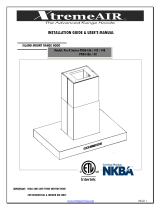 XtremeAir PX06I30 User manual
XtremeAir PX06I30 User manual
-
XtremeAir PX07I48 Installation guide
-
XtremeAir PX06-W30 User manual
-
XtremeAir PX07I48 User manual
-
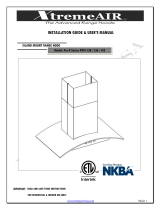 XtremeAir PX01-I42 User manual
XtremeAir PX01-I42 User manual
-
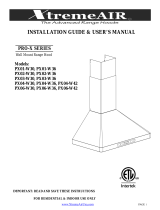 XtremeAir PX04W42B Installation guide
XtremeAir PX04W42B Installation guide
-
XtremeAir PX14-U30 User manual
-
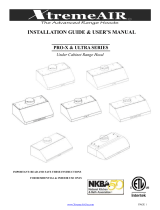 XtremeAir UL13U30 Installation guide
XtremeAir UL13U30 Installation guide
-
XtremeAir PX10-U36 User manual
Other documents
-
Smeg KSM24XU Pdf Mini Bulletin
-
Ancona AN-1157 User manual
-
Ancona AN-1145 Installation guide
-
Ancona AN-1501 User manual
-
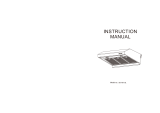 BV -RH-01 User manual
BV -RH-01 User manual
-
Vesta Berlin 900CFM User manual
-
Ancona AN-1155 User manual
-
Awoco RH-WT-2021B Installation guide
-
Cavaliere SV218B2-30-LED User manual
-
Cavaliere SV168B2-30T User manual















